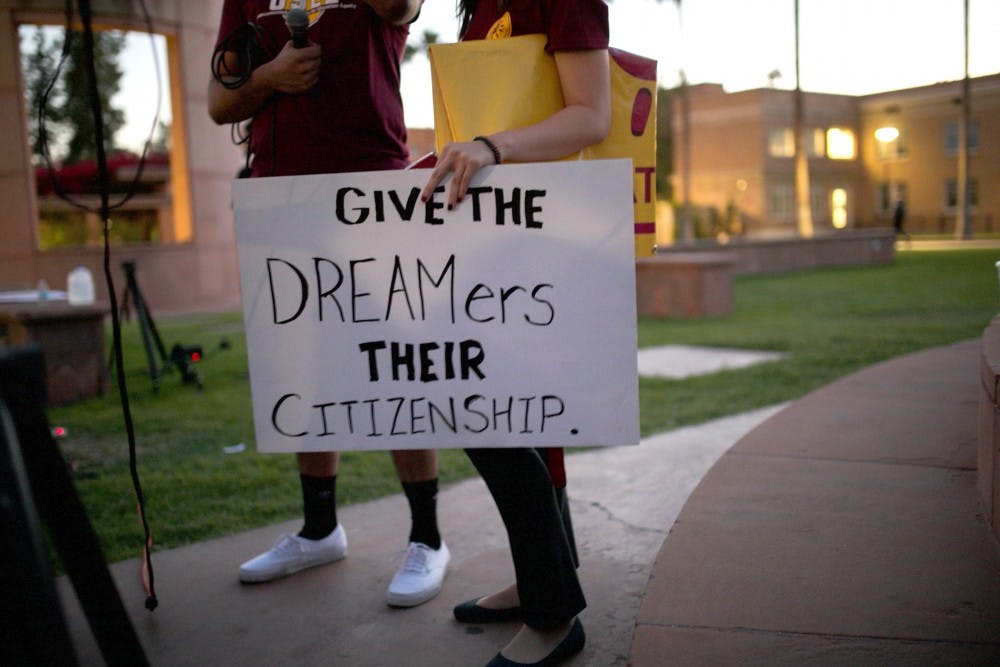Since Sept. 5, when Attorney General Jeff Sessions announced the recision of the Deferred Action for Childhood Arrivals, or DACA, Ruby Rivera has been taking things "day by day." Rivera, an applied biological sciences senior and DACA recipient, has tried to live her life normally, despite the possibility of deportation.
Rivera is one of more than 260 DACA recipients enrolled at ASU and one of 25,000 who live in Arizona. The University administration has offered help in covering renewal fees for students and providing counseling. While some recipients have organized, advocating for a compromise to address their situation, people like Rivera feel overwhelmed, unsure of what they will do when their DACA status expires.
The program gives temporary residency to approximately 800,000 people brought to the country illegally as children, allowing them to go to college and work. President Donald Trump gave Congress a March 5 deadline to put the future of DACA students in law.
Since this decision was announced, students, community activists and state lawmakers have demanded action to address an issue Congress has made little progress on for more than a decade. With neither majority in either party willing to compromise, debates on the issue have stalled, leaving DACA recipients hanging in the balance and uncertain about their future in the country.
But a pair of federal judges temporarily blocked the move to end DACA earlier in 2018. In response, U.S. Citizenship and Immigration Services said it will continue to accept renewal applications while the legal battle is fought.
Rivera said the uncertainty of whether or not the program will come to an end by March 5 has really “taken a toll” on her.
“Having to fight for all this, meanwhile also trying to live a normal life … it’s just so frustrating,” Rivera said.
Rivera said that the judges' decisions give her hope because they mean it’s going to be harder to end DACA, but she still feels uncertain for her future because DACA was only intended as a temporary fix.
Edder Diaz Martinez, a journalism and mass communications senior and DACA recipient, said he’s coping by immersing himself in his advocacy efforts and school. Martinez said that he thinks ASU students should care about the threat to DACA because it's a divisive issue that is "pitting communities against communities.”
“Our reputation from an ASU perspective (is that) we aren’t going to school for free," Martinez said. "We’re paying tuition just like anybody else. Really that’s all we’re asking, to give us a fair shot at an education.”
Jocelyn Lopez, a biomedical sciences freshman, said that students should be concerned about this because DACA recipients are part of the Sun Devil family.
Lopez said that DACA recipients contribute a lot of “knowledge and culture” to the University because they’ve seen different aspects of the world.
Diaz Martinez said that there are many ways to advocate for DACA within local government, but that all efforts start with civic engagement.
“If you want to see policies that really reflect our views and policies that are pro-dreamer, we need to make sure that we’re advocating for Latinos, minorities, women to go out there and vote,” he said. "Despite our inability to vote, we have the power to sway elections and encourage our families and communities to vote.”
Perla Martinez Lugo, a computer science freshman, said that the judges' decisions give her hope “especially because there were lots of people that couldn’t come up with the money to reapply” and this gives them a chance to renew DACA and keep their status.
However, Martinez Lugo said, "it’s more urgent now than ever to come up with a permanent solution.”
But Congress has yet to agree on what kind of future DACA recipients will have. Many Democrats lobby for a "clean" DREAM Act, which would protect DACA recipients without funding further immigration restrictions, while many Republicans say any proposed legislation must include funding for a border wall and increase interior enforcement.
The passing of the DREAM Act would be ideal for DACA recipients. But for Martinez Lugo, a compromise involving heightened immigration enforcement would not be a clean victory.
"It really doesn't feel like a victory," she said. "It feels like a defeat. There's still going to be people that are oppressed, and that's what we don't want."
A wall in exchange for a pathway to citizenship for undocumented immigrants, Diaz Martinez said, would not be a fair trade.
"Putting the wall on the backs of Dreamers is wrong and it’s unjust and it’s unfair,” he said.
Rivera said that if there was a deal that included the wall, she would accept it because it would have no effect.
"To some people, it’s worth trying to come here even if it means dying, and that wall isn’t going to stop people," she said.
Reach the reporter at ajmistry@asu.edu or follow @jay_mistry52 on Twitter.
Like The State Press on Facebook and follow @statepress on Twitter.




